On rare occasions the world of theatre and the world in which we live converge: the subject of the theatre we witness on the stage and the subjects we hear on the streets and on the news harmonize, like a dialogue where each utterance builds upon the one preceding it.

The Promised Land, by Shachar Pinkas and Shay Pitnvsky, the third installment of Mosaic’s 2016 Voice from a Changing Middle East Festival, does just that. And the significance of the production reverberates long after the show has ended.
Two days ago, Pope Francis stood at the border between Mexico and the United States, at Ciudad Juarez, in the Mexican state of Chihuahua, and beseeched the powers that be to have mercy on the “most poor and vulnerable.” He said: “We cannot ignore the humanitarian crisis that has brought the forced migration of thousands of persons.”
Then yesterday, when asked about “The Wall” being proposed by many Republicans during this election cycle, the Pope responded: “A person who only thinks about building walls, wherever they may be, and not building bridges, is not Christian.”
Start Promised Land.
The silhouette of human beings standing on the other side of a “security fence” or “Wall” (with sets and lights by Andrew R. Cissna). Their shadows, as if clinging to that barrier separating us from them, demand that we witness their struggle.
Enter the politician, the mayor of the Israeli town of Eilat (Felipe Cabezas), who explains to the assembled audience that Israel cannot afford to take in these “huddled masses.”
And then the stories begin, real stories of Eritreans and Sudanese, most of them about children (compiled by the Habimah Youth Ensemble), who have fled the violence ravaging their towns and villages, and are seeking asylum in Israel.
Those in America who understand the plight of Central Americans and Mexicans, many of them children, who flee the violence of cartels and gangs ravaging their towns and villages will grimmace at the similarities.
Those in Europe who are currently struggling with the millions of “forced” immigrants from Syria, Iraq, and Afghanistan will understand the similarities.
The political rhetoric that is responding to the fear and greed of citizens versus the reality of human suffering taking place in the world could not be more parallel: “We have our way of life. We don’t want anyone here to disrupt it.”
For anyone with empathy in their blood, sending people who are “forced” to immigrate “back home” is simply not an option.
The seven-member ensemble for Promised Land does a phenomenal job presenting the plight of these refugees, as well as the roles of the soldiers and bureaucrats who guard and process them, and the ordinary citizens who do their best to obey the law and their conscience at the same time.
The style of the show, directed by Michael Bloom, is decidedly not representational. The actors do not attempt to “become” the characters. The human suffering they experience would have simply been too painful to put up-close and personal. They offer their stories for consideration, not for identification. The costuming by Marci Rodgers, as is the music and sound design by Eric Shimelonis, is earthy and direct.
There is the child, Emmanuel, played adroitly by Brayden Simpson. His mother and father, played sincerely by Audrey Bertaux and Gary-Kayi Fletcher, do everything they can to protect him from the soldiers invading their village.
There is Emmanuel’s friend, Joseph, played stoically by Aaron Bliden, who traipses hundreds of kilometers with Emmanuel without food or water to reach the Israeli border.
There is the child Nadak, played with simplicity by Kathryn Tkel. There is her mother, played conscientiously by Awa Sal Secka. She does what she can to maintain both her dignity and her child’s hope in a brutal, if considerate, world.
Then there is Ali Adams (also played by Mr. Fletcher), who waits earnestly in detention for one, two, three years for his temporary visa.
These stories are offered without melodrama. Because the actors are older and don’t embody the characters, there is no bending of the emotional heart strings to gain sympathy.
Instead, the audience is left with a simple proposition. Will there be empathy for the “most poor and vulnerable” or will the well-off and economically secure create walls both real and metaphorical to disappear them.
In Israel the word used is “infiltrator”. In the US, the phrase used is “illegal immigrant.” Even the phrase “undocumented immigrant” has an ambiguous ring to it.
For, according to the UN 1951 Refugee Convention, a refugee is someone who “owing to a well-founded fear of being persecuted for reasons of race, religion, nationality, membership of a particular social group or political opinion, is outside the country of his nationality, and is unable to, or owing to such fear, is unwilling to avail himself of the protection of that country.”
According to the UN Refugee Agency, by the end of 2014 there were globally almost 60 million refugees, of which half were children. That’s 1 out of every 122 people on earth living displaced from their homes.
Not since World War II have the numbers been so high, and the numbers continue to escalate.
Meanwhile leaders speak of walls; they speak of more war; they speak of more fear, more hatred, more alienation.
Mosaic’s Promised Land challenges its audience to face those grim numbers honestly and empathetically, asking not what must be done, but what should be done to address the large scale humanitarian crisis that confronts the world?
Promised Land is that different kind of theatre where entertainment is not the wonder of the quip or the soaring musical number; but the experience of discovery and the joy of realization.
It is that kind of theatre where the aesthetic distance between viewer and subject has been reduced to the exact space between actor and audience. In Woolly Mammoth’s rehearsal room that distance is between 5 and 15 feet.
So we, the audience, now must decide how the drama will play out.
More walls? More refugees? More violence? More camps? More assistance? More stability?

And, as we consider the possible outcomes to these stories, Promised Land demands, with fine artistry, that we see ourselves as those refugees, each and every one.
Running Time: 70 minutes, without an intermission.
Promised Land plays through February 28, 2016 at Mosaic Theater Company of Washington performing at Woolly Mammoth Theatre Company – 641 D Street, NW, in Washington, DC. For tickets, call the box office at (202) 393-3939, or purchase them online.
LINK:
John Stoltenberg on ‘Promised Land’ in his column Magic Time! on DCMetroTheaterArts,
RATING:





